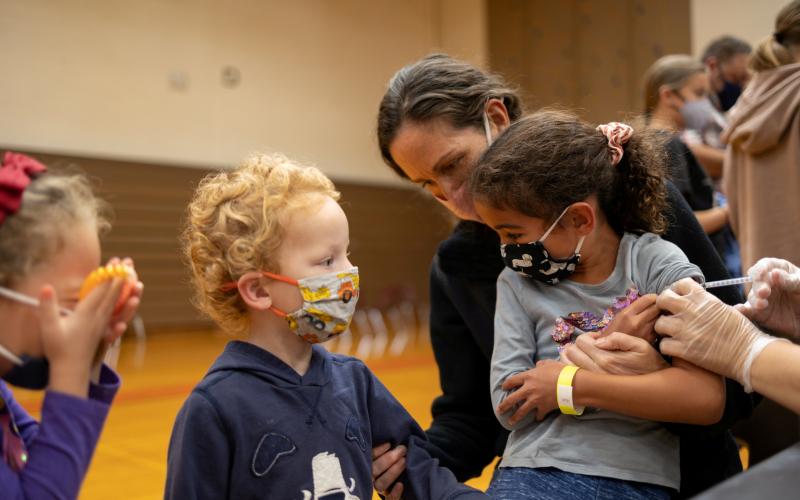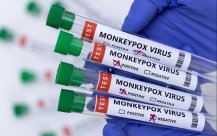
Two years have passed, and the global crown disease is still repeated.
The coronary vaccine developed by the pharmaceutical dealer seems to be unable to keep up with the speed of the virus variant. After two needles, you need to add additional agents.
Now, five or even younger children are vaccinated with coronary disease.
It is not easy to convince adults to get vaccines, and it is even more difficult to persuade parents to get vaccines.
Parents are worried that young children may have long -term side effects when they have crown vaccines.
Although the new variant of the crown disease, Omikon is not fatal than the previous Delta strain, but the spread is faster, which has led to an outbreak again in many places around the world.In New York City in the United States, patients with crown diseases who are admitted to be hospitalized have recently increased, and about half of the hospitalization patients are less than five years old.
Experts remind that children are infected with infection and may also become a source of infection, especially for children's protection awareness, and it is difficult to maintain a safe social distance.In addition, children often enter and exit densely or closed places, such as schools, shopping malls and playgrounds.Especially at school, once the epidemic is out of the epidemic, the virus can easily spread quickly.Vaccination can effectively block the spread of the virus, allow children to return to normal study and return to school.
Dr. Sallie Perma, director of the Pediatric Department of Wil Cornell Medical College, said: Although children are not the main group of illness in the epidemic in the crown disease, there are also deterioration of children after child infection and evolving into severe illnesses.And even death.
She added that children without infection have also been seriously affected by the epidemic for a long time.They couldn't meet their friends, they could only read teachers lectures through the screen.Long -term closed environment will make children feel anxious and depressed.But now we have the opportunity to get immunity through vaccines and let their lives return to the right track.
The US Food and Drug Administration (FDA) approved the Emergency use of Pfizer Children's vaccine in October last year, and started vaccination for children aged 5 to 11 in November.The European Drug Administration (EMA) also approved the inoculation of Pfizer vaccine in this age.In a trial for children 5 to 11, Pfizer vaccine's effective rate of preventing symptoms of crown disease was 90.7%.
Nevertheless, many parents have doubts about the crown vaccine. They do not want to get inocus, or temporarily take a wait -and -see attitude to see the reaction after other children's vaccination to make a decision.
Most of the reasons given by parents are that there are too many vaccines who do not want their children to become an experimental object. There are too many unknown young people who are afraid of playing so many vaccines are afraid of physical unbearable.
Polls: More than half of the parents are not assured to let their children vaccine
The US polls found that more than half of the parents were not assured to let their children vaccine.Only one -third of parents in the Netherlands are willing to let their children vaccine.Although Italy has nearly two -thirds of adults supporting coronary vaccine vaccination, only 40%of the parents who let children from 5 to 11 years old.
According to the survey, some parents have doubts, mainly because of the current data that still lacks long -term side effects.One -third of the heads believe that the risk of children infection is not high, so there is no need to vaccinate.
The survey conducted by the United States Non -profit organization, Kaiser Family Foundation, found that about half (51%) adults believe that inoculation of crown vaccine is a personal choice, and the other half (47%) is considered social responsibility.As for the vaccination for children, two -thirds (65%) Parents believe that this is the personal choice of parents, and one -third (34%) believes that parents have the obligation to allow their children to inoculate to protect the safety of others.
Parents' greatest concerns are the effectiveness and long -term safety of crown disease vaccines enabled under authorization.Especially when children 5 to 11 have not yet entered the developmental period, whether they injection of coronary vaccines will affect development and growth, and even cause children to be infertile in the future?
Dr. Perma showed that this is the wrong statement. No data shows that the coronary vaccine will lead to infertility, and there are no biological reasons for us to suspect that it will cause infertility.In addition, the MRNA vaccine has a short survival time in the body and will not be integrated with the deoxyrum ribonucleic acid (DNA).
Dr. Perma emphasized that the benefits of vaccination are far more than the risk of crown disease.As a pediatrician, we have treated children who have to take life measures due to crown diseases, and some of them have failed to rescue.We now master the ultimate tools against coronal virus, that is, by vaccination to prevent infection viruses.
Expert: The risk of not vaccination is greater
When I was the mother of the two children, when I was my turn to get the vaccine, I immediately made an appointment for vaccination, but when it was an 18 -year -old boss inocular, I considered it for a long time to help her register.The second child of the 11 -year -old is also approved by the crown vaccine. I hesitated for a while, thought a lot, and thought about it.Will there be serious side effects?Will it affect development?Is it not high?Will the body go wrong?If you do not take a vaccine, will it be easily infected after school?In case of diagnosis during the exam, will the child complain that I did not let her vaccine?In the end, I still choose to believe in medical experts, because I am not an expert in this area.
Pediatric experts believe that it is normal for some parents to have such doubts or concerns.Lee Savio Beers, chairman of the American Academy of Pediatric Society, said: Parents will certainly understand the situation before making decisions for their children's health.There are many information about the coronary vaccine, but many of them are false information. It is not easy to distinguish authenticity.
According to experts, including coronary vaccine, there are rarely serious side effects that may lead to long -term health problems after vaccination.
Bills pointed out that most of the side effects caused by vaccines are mild and temporary, and they will improve in two or three days.If you are infected with crown disease unfortunately, you may suffer from cardiitis or other severe complications, and even enter the intensive care unit and need oxygen supply.Children may also have coronary disease-related children's multi-system inflammatory syndrome (Multisystem Inflammatic Syndrome in Children (MIS-C).MIS-C can cause inflammation of the heart, lungs, kidneys, skin, eyes, or gastrointestinals, and has killed many children in the United States.
Bils added that coronal virus has been variant, and many countries have begun to gradually be reopened, and children may become more and more vulnerable to infection. Therefore, parents should allow their children to vaccine to protect them and the people around them.
David Kimberlin, a pediatric expert at the Alabama Children's Hospital, said: There are too many unknown epidemics. We must do our best to protect ourselves and protect our children.
Jin Bolin said that many of his patients are young people who are qualified for vaccination, but because they did not vaccine, they developed into severe illnesses after diagnosis, and they must rely on respirators.This scene often makes parents sad.They should be very clear in their hearts that this situation can actually be avoided.
As of early December last year, more than 2.3 million children aged 5 to 11 are infected with crown disease, of which 209 children have died.
Dr. Amanda Cohn, an American FDA Consulting Commission, who supports children 5 to 11 years old, pointed out that crown diseases are currently a disease that can be prevented by vaccination.She emphasized that in the past year, crown disease is the eighth major disease of children at this age.Vaccine can not only avoidFor death and severe illnesses, it can also avoid long -term adverse reactions.
Asia -Pacific European and American children start vaccination
On December 27 last year, Singapore began to inoculate Pfizer / Fu Bitai vaccine from 5 to 11 years old.On the first day of the children's vaccine vaccination plan, the seven pediatric vaccine vaccination centers made a full appointment, and a total of 3,300 children were vaccinated.In addition to Singapore, which other countries have launched children with coronary vaccination?
■ Asia Pacific
China approved the vaccine of Kexing Bio and Sinopharm Group for children aged 3 to 17 in June last year, and began to use it in the age of 12 in late October.Hong Kong approved the inoculation of the Cocye vaccine for children three and above at the end of November last year.In December last year, Indonesia began to vaccinate the Koto vaccine 6 to 11 years old.
Malaysia, the Philippines, Thailand, and South Korea temporarily only allowed teenagers to vaccines with crown diseases.Australia and New Zealand will be vaccinated with Pfizer vaccines from 5 to 11 years old from January this year.
■ European and American countries
In November last year, the United States began to vaccine the Pfizer vaccine from 5 to 11 years old. At present, about 5 million children have the first needle.Canada also approved the inoculation of Pfizer vaccine in this age, and began promotion work in early December last year.
In Europe, Italy has also approved to vaccinate the Pfizer vaccine from 5 to 11 years old.France approves high -risk children with crown diseases and children who live with the infected disease group to vaccine Pfizer vaccine.Germany is expected to take a crown vaccine for children from 5 to 11 years earlier this year.Britain temporarily only allowed to vaccine from 12 to 15 years old.
In Latin American countries, Cuba and Venezuela were vaccinated for children as young as two years old.In Argentina, you can vaccinate when you are 3 years old.Chile children's inoculation ages are 6 to 11 years old.
■ Middle East and other places
Israel, Oman, Saudi Arabia, Barin and the UAE have all approved the use of Pfizer's vaccine to vaccinate children, as low as five years old.Chile and El Salvador approved the vaccine of the age of 6 to 11 years old.Costa Rica forced children over 5 years of age to vaccine.




